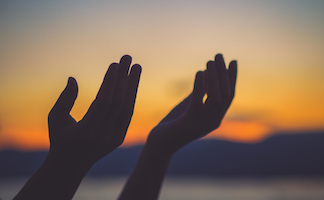Our Highest Priority

How do we prioritize our lives? What is important to us as Americans? What might make us happier? The questions are huge, but the answers may lie somewhere between the lines and not directly found in polls, studies, or investigations. Let’s explore these issues together.
Every month, the Gallup organization takes a survey called the “Most Important Problem.” What were the top six problems in September 2020?
In order: The Government, Coronavirus/Disease, Racism, Crime, Unifying the Country, and a lack of Ethics/Morality. However, when I took a peek at February 2020, pre-lockdown, pre-COVID feelings, the same issues can be noted, in the same order.
Though concerns about Coronavirus doubled (as we might expect) and concerns about Racism increased by four times, Americans did not make Unifying the Country or Ethics/Morality a big deal. In fact, those concerns barely made a ripple.
In June 2020, the University of Chicago painted a more personal portrait of priorities in their poll. The study “finds that just 14% of American adults say they’re very happy, down from 31% who said the same in 2018. That year, 23% said they’d often or sometimes felt isolated in recent weeks. Now, 50% say that. The study found that we haven’t been this miserable and this disconnected since 1972.
But doesn’t the social media, cable television, and numerous digital platforms brag about how connected we’ve all become? Unfortunately, those are just words. Not only do we feel disconnected, but the survey found more of us are feeling left out of life, and we lack basic human companionship.
Due to COVID?
One of the more than 1,000 respondents in the University of Chicago study might offer an important key to tying this together.
The respondent was a successful digital marketing manager for a large law firm before COVID hit us. He lost his job. Please reflect on his words:
“The year 2020 just fast-forwarded a spiritual decay [for me]. When things are good, you don’t tend to look inwards,” he said, adding that “[I] was living and working in the Miami area before the pandemic hit. As Florida dealt with the virus, [my] girlfriend left me, and I decided to leave for Austin. I probably just wasn’t a nice guy to be around from all the stress and anxiety. But this forced an existential crisis.”
Is it possible that so many of us are feeling unhappy, isolated, left out, and lacking human companionship because we have lost our spiritual core? Wikipedia says that Christianity is the most adhered to religion in the United States and that 70.6% of adults identify themselves as Christians. Do those who consider themselves Christians because it seems the most fitting of options, who see it as a label rather than a lifestyle, an affiliation rather than a life-altering commitment?
The Gallup Poll showed that of all the issues people place as a priority, a lack of ethics, morality, and spiritual grounding hovers at a meager 2-to-3 percent. Interestingly, the top priority items, such as the national economy or “the government,” are not issues we can individually do much about.
We can do plenty, as individuals, to help heal other situations!
Have we lost our way, and it is making us unhappy? This has been weighing on us since way before COVID. COVID might have “fast-forwarded” it, but these problems have been with us all along.
I’m Not Preaching, Just Pointing
I’m not preaching, advocating a religion, or telling anyone that they should be more spiritual. However, I am pointing out that the rise in racism, the lack of greater unity in our nation, the upsurge in crime, the huge surge in isolation, and the deficiency of human companionship, are all related.
When we feel lonely and isolated, when we fail to love the stranger as ourselves, when we fill our lives with “stuff,” and social media and digital gadgetry and not people, we are unhappy. This is not a far-fetched theory, but something psychologists and social workers have long noted and warned us about.
In our various versions of “lock-down,” we must place people first. The strangers we meet, the lonely and isolated, the disconnected need us, as we need them. Take a chance, say “hello” to someone you don’t know, understand they are hurting too. How you make others feel about themselves says a lot about you. Again, I am not preaching, but this time suggesting, we should never put people down, except on our prayer lists.
Simply put, we need each other. I contend that it should be our highest priority.
___________________________________________________________________________
For more information about Hall of Fame speaker and bestselling author Steve Gilliland and the Gilliland Foundation, please contact steve@stevegilliland.com / 724-540-5019 / www.stevegilliland.com.